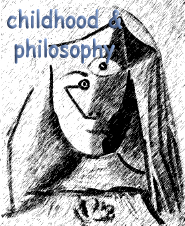mapping identity prejudice: locations of epistemic injustice in philosophy for/with children
DOI:
https://doi.org/10.12957/childphilo.2020.47899Keywords:
epistemic injustice, testimonial and hermeneutic injustice, prejudice, community of inquiry, philosophy for/with childrenAbstract
This article aims to map the locations of identity prejudice that occurs in the context of a Community of Inquiry. My claim is that epistemic injustice, which usually originates from seemingly ‘minor’ cases of identity prejudice, can potentially leak into the actual practice of P4wC. Drawing from Fricker, the various forms of epistemic injustice are made explicit when epistemic practices are framed within concrete social circumstances where power, privilege and authority intersect, which is observable in school settings. In connection, despite the pedagogical improvements P4wC offers, some forms of identity prejudice prevalent in traditional classrooms may persist, affecting children who are identified with negatively stereotyped social groups. It is, therefore, important to pay attention to the reality of epistemic injustice and the possible locations where it may potentially surface in the COI. Drawing from my P4wC experience, I show that identity prejudice stems from the intersections of the roles and positionalities of the participants in a philosophical dialogue. These intersections point towards the epistemic relationships of the P4wC teacher, the students, and the P4wC program itself. I conclude that identity prejudice arises circumstantially and/or substantively in P4wC scholarship and practice.
Downloads
References
Baumtrog, Michael. “Navigating a Necessary Inequality: Children and Knowledge-Based Injustice” in Alternative Routes: A Journal of Critical Research, Vol. 29, 2018, pp.294-306.
Beeby, Laura. “Epistemic Justice: Three Models of Virtue” in The Routledge Handbook of Virtue Epistemology, ed. Heather Battaly, New York: Routledge, 2019.
Benner, Aprile, Crosnoe, Robert and Jacquelynne Eccles. “Schools, Peers, and Prejudice in Adolescence,” in Journal of Research on Adolescence, 25 (1), 2014, pp.173–188.
Burroughs, Michael D. and Deborah Tollefsen. “Learning To Listen: Epistemic Injustice and the Child” in Episteme, 13, 3, 2016, pp. 359–377.
Chetty, Darren. “Racism as ‘Reasonableness’: Philosophy for Children and the Gated Community of Inquiry,” in Ethics and Education, 2018, pp.39-54.
Cohrs, J. Christopher & John Duckitt. “Prejudice, Types and Origins of,” in The Encyclopedia of Peace Psychology, First Edition, edited by Daniel J. Christie, UK: Blackwell Publishing Ltd., 2012, pp.1-7.
Elicor, Peter Paul. “Philosophical Dialogues with Indigenous Children: An Attempt to Integrate Indigenous Forms of Knowledge in Philosophy for/with Children,” in Childhood & Philosophy, Vol.15, June 2019. pp.1-22.
Fricker, Miranda. Epistemic Injustice: Power & the Ethics of Knowing. New York: Oxford University Press Inc., 2007.
Golu, Florinda. “Prejudice and Stereotypes in School Environment: Application to adolescence” in Procedia - Social and Behavioral Sciences, 78, 2013, pp.61-65.
Guin, Philip. “Countering Prejudice with Counterexamples” in Studies in Philosophy for Children: Harry Stottlemeier’s Discovery, eds. Ann Margaret Sharp & Ronal F. Reed, Philadelphia: Temple University Press, 1992, pp.135-143.
Kizel, Arie. “Enabling identity: The challenge of presenting the silenced voices of repressed groups in philosophic communities of inquiry,” in Journal of Philosophy in Schools, 3, 1, 2016, pp. 16-39.
Kotzee, Ben. “Education and Epistemic Injustice” in The Routledge Handbook of Epistemic Injustice, edited by Ian James Kidd, José Medina, and Gaile Pohlhaus Jr., New York: Routledge, Taylor & Francis Group, 2017, pp.324–355.
Lipman, Matthew. Thinking in Education 2nd ed. New York: Cambridge University Press, 2003.
______.” Philosophy for Children: Some Assumptions and Implications,” in Ethics in Progress, Vol. 2, No. 1. 2011.
Lone, Jana Mohr. “Philosophical Thinking in Childhood,” in The Routledge Handbook of the Philosophy of Childhood and Children, eds. Anca Gheaus, Gideon Calder and Jurgen de Wispelaere, New York: Routledge, 2019.
Madrid, María Elena. “Multiculturalism, Extreme Poverty, and Teaching P4c in Juchitán: A Short Report on Research,” in Childhood and Philosophy Vol. 4, No. 8, 2008, pp.125-135.
Medina, Jose. “Epistemic Injustice and Epistemologies of Ignorance” in The Routledge Companion to the Philosophy of Race, Edited by Paul C. Taylor, Linda Martin Alcoff, and Luvell Anderson, New York/London: Taylor and Francis, 2017, pp.247-260.
Murris, Karin. “The Epistemic Challenge of Hearing Child’s Voice,” in Stud Philos Educ., 2013, pp.245-259.
Rainville, Hell. “Philosophy for Children in Native America. A Post-Colonial Critique,” in Analytic Teaching and Philosophical Praxis, vol. 21, no. 1, 2001, pp.65-77.
Reed-Sandoval, Amy and Alain Sykes, A. “Who talks? Who listens? Taking ‘positionality’ seriously in philosophy for children” in The Routledge International Handbook of Philosophy for Children, eds. Maughn Rollins Gregory, Joanna Haynes and Karin Murris, 2017, pp.219-226.
Santoro, Daniele & Manohar Kumar, “Being Bound to Fail: How Epistemic Injustice fails Educational Opportunities,” a paper presented to the IMERA Resident Seminar (2014), the II Philosophy of Education Conference, Bangalor (2014), retrieved April 20, 2018, from: https://imera.univ-amu.fr/sites/imera.univ-amu.fr/files/being_bound_to_fail.how_epistemic_injustice_fails_educational_opportunities_draft_0.pdf.
Schües, Christina. “Epistemic Injustice and Children’s Well-being,” in Justice, Education and the Politics of Childhood: Challenges and Perspectives, eds. Johannes Drerup, Gunter Graf, Christoph Schickhardt, Gottfried Schweiger, Switzerland: Springer, 2016, pp.155-170.
Sharp, Ann Margaret. “The Other Dimension of Caring Thinking (with a new commentary by Philip Cam),” in Journal of Philosophy in Schools 1 (1), 2014.
Sherman, Benjamin R. & Stacey Goguen. “Introduction” in Overcoming Epistemic Injustice: Social and Psychological Perspectives, eds. Benjamin R. Serman & Stacey Goguen London/New York: Rowman & Littlefield International, Ltd., 2019, pp.1-14.
Steele, Claude. “A Threat in the Air: How Stereotypes Shape Intellectual Identity and Performance,” in American Psychologist by the American Psychological Association, Inc. Vol. 52, No. 6, 1997, pp.613-629.




